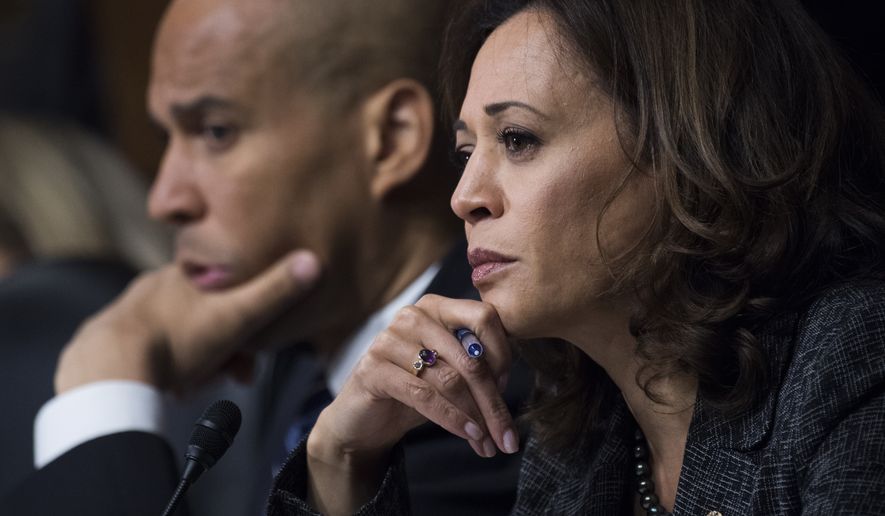Democrats have the highest-powered and most diverse potential presidential field in history, including two candidates who are black — yet two black leaders say none of them stands out so far.
Sen. Cory Booker, a New Jersey Democrat and former mayor of Newark, doesn’t have a great reputation with activists, said Hawk Newsome, president of Black Lives Matter in greater New York. Sen. Kamala D. Harris, a California Democrat whose parents were Indian and Jamaican, has a problematic background as a former prosecutor, he said.
“I hope black people can find a true champion,” he said, arguing that none of the candidates has done enough to address problems for his community.
Tanya Faison, a Black Lives Matter leader in Sacramento, California, is also dissatisfied with the two black senators. She said Mr. Booker is generally OK but could be doing more, whereas she doesn’t support Ms. Harris at all.
“We already live in a police state, and her record shows that she basically supports the criminal justice system as it is. And it’s the system I’ve been fighting to get fixed,” she said.
“I have a feeling it’s going to be a good competition between the two of them, because I think he’ll be calling out her flaws,” she added.
As black leaders both inside and outside Washington take stock of the field, they say none of the candidates has the inside track on black Democrats’ support.
Ideally, Mr. Newsome wants someone like businessman Andrew Yang to dominate the primaries or for former first lady Michelle Obama to jump into the race.
Former President Barack Obama depended on black voters to help him overcome the Clinton political machine and capture the Democratic Party’s nomination in 2008, en route to his historic victory for the White House.
But neither Ms. Harris nor Mr. Booker has the inside track on black voters, who made up 27 percent of the Democratic primary in 2016, according to a review by Public Opinion Strategies. That trails whites, who made up 62 percent, but it is far above Latinos at 7 percent and Asians at 2 percent.
Local chapter leaders of the NAACP say they’re looking for a Democrat who, in addition to the usual topics of the economy and foreign policy, is able to champion voting rights and combatting a rise in white nationalism.
“You talk about criminal justice, but I want to see you do more. I want to see them put their foot down,” Yvette Lewis, NAACP president in Hillsborough, Florida, told The Washington Times.
Richard Rose, the president of the Atlanta NAACP chapter, said support for candidates such as Ms. Harris and Mr. Booker will become even more complicated as big-name Democrats such as former Vice President Joseph R. Biden decide whether to run.
Mr. Biden had 26 percent support among black voters in a Politico/Morning Consult poll. Ms. Harris garnered 16 percent of black voters’ support and 7 percent of all voters. Mr. Booker had 5 percent of black voters and 3 percent overall.
“African-Americans running for office trying to seek the Democratic vote or nomination is not that easy,” Ms. Lewis said, adding that Democrats “work with us, they have lunch with us, they have dinner with us, but they don’t have much confidence in us.”
Mr. Rose predicted Ms. Harris or Mr. Booker will have to drop out relatively early.
“I don’t think there’s going to be enough bandwidth for two prominent candidates of people of color,” he said.
Both Ms. Lewis and Mr. Rose praised the two senators for their work on criminal justice and civil rights issues.
Mr. Newsome said he would back Ms. Harris, if he had to choose from the current field.
“She’s the strongest of the bunch,” he said. “Realistically, in the last few years, she’s been on the right side of the issues.”
One major goal for the entire Democratic field is to win the support of members of the Congressional Black Caucus.
The group is not picking sides, even though both Ms. Harris and Mr. Booker are members.
“I think we are seeing some of the candidates so far, many more to come,” said Rep. Karen Bass, the caucus’ chairwoman. “The field isn’t finished.”
Ms. Bass said she has spoken to Ms. Harris and sees her and Mr. Booker in CBC meetings.
“I think they’re both doing a fantastic job,” Rep. Donald McEachin of Virginia told The Times. “It’ll be interesting to see how it all develops.”
Rep. Barbara Lee is the only CBC member to take a strong stance on the primary field, enthusiastically endorsing Ms. Harris on Thursday.
Mr. Obama in 2008 was also a member of the CBC and had strong, though not unanimous, support of its members in the Democratic primary. The others split between Hillary Clinton and John Edwards.
Dot Scott, the president of the NAACP chapter in Charleston, South Carolina, said elections are bigger than the black candidates running.
“We just want good candidates,” she said. “We don’t even think about what color they are.”
South Carolina is considered the first big test of black votes in the Democratic nomination battle, with black people accounting for most of the voters in the state’s primary.
Patrick Murray, the director of the Monmouth Polling Institute, said he expects that state’s primary election to be the defining moment in the Democratic calendar.
“If no clear winner is emerging out of the first two contests, then the winner of South Carolina becomes one of the top-tier candidates who is left standing,” Mr. Murray said. “The preferences of black voters is going to become very important in this because they’re probably going to hold sway.”
Ms. Scott said she was excited about the focus on her state’s primary. She said she already met with a few candidates and is working with the Democratic Party for more to visit South Carolina.
• Gabriella Muñoz can be reached at gmunoz@washingtontimes.com.




Please read our comment policy before commenting.